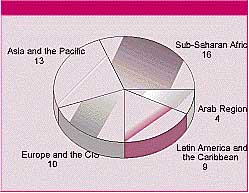1997
Still dying while growing and giving birth
At the WSSD, the governments committed
themselves to have national plans for eradicating poverty elaborated
during 1996. They had to be able -via studies, projections and political
will- to define the date, approximately the year they estimated people
in their countries would stop perishing while giving birth or dying
while growing. The year in which people, all the people, would stop
walking three kilometres to reach safe drinking water or ten to arrive
at the nearest school and find it roofless, bookless and with no
teachers.
The 1996 UN General Assembly went by, the
Year for the Eradication of Poverty went by. National Social Watch
coalitions extensively report in this book about anti-poverty efforts in
their countries. Internationally, UNDP, the United Nations Development
Programme, is the main agency in charge of the Social Summit follow-up.
UNDP launched in March 1996 a Poverty Strategies Initiative (PSI), in
support of the government's implementation of the WSSD commitments.
The Initiative is being financed from
UNDP redeployed resources amounting to $11 and donor contributions to a
Trust Fund for Follow-Up Activities to WSSD, which has been especially
established to support the achievement of the WSSD poverty eradication
commitments. Donor pledges currently stand at $9 million, including $1mn
and $2mn already transferred to the UNDP treasuries by the Governments
of Denmark and the Netherlands, respectively. Additional commitments are
expected from the Governments of Norway and Switzerland, amounting to up
to $7.5 million.
Current status
As of 31 October 1996, 52 proposals from
UNDP programme countries have been approved for PSI funding. Almost half
of the projects approved originated in low-income countries, and about
40% in LDCs. In terms of human development, more than 50% of the
proposals have come from countries with medium human development status,
with a further 40% belonging to the low human development category. (See
Graphic)
The fact that work has begun in over 50
programme countries in just seven months since the launching of the
initiative is considered by UNDP as a positive development. It shows a
high degree of interest on the part of UNDP programme countries as well
as responsiveness and celerity on the part of UNDP country offices and
headquarters.

Another 15-20 proposals are currently in
the pipeline, awaiting for additional funding to become available for
programming. In this regard, the Government of Norway has formally
expressed its willingness to contribute up to NOK 35 million to the PSI
Trust Fund. Half of the amount will be geared towards supporting country
level implementation of the 20/20 initiative, aimed at the promotion of
universal access to basic social services for all. Negotiations are
currently under way in order to finalise the agreement with Norway and
have the funds transferred to UNDP at an early date.
Likewise, the Government of Switzerland
is considering the possibility of contributing an amount of SF 2 million
to the Trust Fund, and a final decision from the Swiss is expected soon.
All the proposals are geared toward
providing upstream support in the areas of poverty analysis, policy
review and strategy formulation. This has often involved undertaking
poverty surveys and assessments to supplement existing poverty
information where data gaps exist; engaging national partners in a
review of the policy and institutional framework for poverty reduction;
assessing the impact of current social policy and poverty programmes on
vulnerable groups; mapping alternative policy choices for poverty
reduction; building consensus and validation among national actors on
the nature and causes of poverty as well as the most effective
strategies to combat it; and strengthening national capacity for poverty
and social policy analysis, monitoring and evaluation of social
programmes, etc. In at least one case (Burkina Faso), the PSI has
provided an opportunity for linking WSSD follow-up with the
implementation of the 20/20 initiative, focusing on the restructuring of
public expenditures for provision of universal access to basic social
services.
According to UNDP "the Poverty
Strategies Initiative has been proceeding smoothly until now,
demonstrating a high degree of commitment on the part of UNDP country
offices and national partners to the agreement reached at Copenhagen.
Lessons are being drawn as implementation gets under way, and will be
widely disseminated and shared among countries and regions. Donor
contributions for the Poverty Strategies Initiative, furthermore, have
not materialised as quickly as had been expected. This has created a
shortage of resources in the case of various regional bureaux, leading
to a slowdown in the implementation of the Initiative."
|
Arab
Region
|
Asia and
the Pacific
|
Eastern
Europe & Central Asia
|
Latin
Amer. & the Caribbean
|
Sub-Saharan
Africa
|
Approved
Djibouti
Marruecos
Sudán Yemen |
Approved
Afghanistán
Bhutan
Cambodia
China
Fiji
Iran
Maldives
Mongolia
Myanmar
Papua New Guinea
Thailand
Vanuatu
Vietnam |
Approved
Armenia
Bulgaria
Georgia
Kyrgyzstan
Latvia
Moldova
Romania
Turkey
Turkmenistan
Uzbekistan |
Approved
Cuba
Grenada
Guatemala
Guyana
Honduras
Mexico
Nicaragua
Paraguay
Trinidad & Tobago |
Approved
Botswana
Burkina Faso
Central African Republic
Ethiopia
Gabon
Gambia
Ghana
Guinea Bissau
Kenya
Malawi
Mauritania
Senegal
South Africa
Tanzania
Togo
Zimbabwe |
Pipeline
Jordan
Lebanon
United Arab Emirates |
Pipeline
India
Nepal |
Pipeline
Azerbaijan
Polan |
Pipeline
Argentina
Costa Rica
Dominican Rep.
El Salvador
Panama
Peru
Uruguay |
Pipeline
Angola
Cape Verde
Mali
Tchad
Uganda |
|